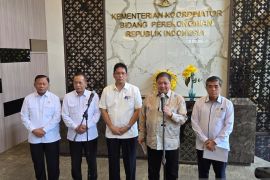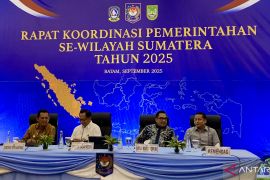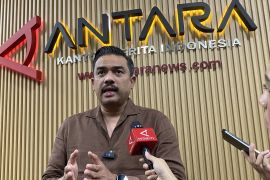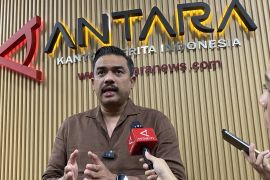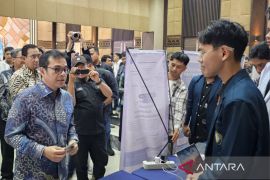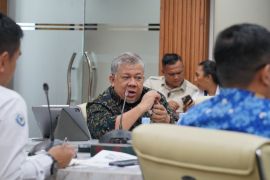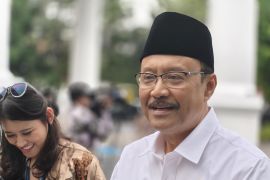"We will continue maintaining economic stability and applying macroeconomic patterns in 2014. If we can do this, it can serve as an effective base for the implementation of development programs by the new government," Finance Minister Chatib Basri stated last Wednesday.
He added that the current government will do its best to maintain economic stability although it is facing political events this year, through a legislative election on April 9 and a presidential race on July 9.
The year of 2014 is actually a tough year. According to Bank Indonesia (BI) Governor Agus Martowardojo, the economy still faces tough challenges in 2014, though this year it has been performing better than last year so far.
"Therefore, BI, regional governments and other stakeholders must intensify their cooperation in stabilizing the economy," he pointed out on Friday.
Therefore, President Susilo Bambang Yudhoyono, according to Chief Economic Minister Hatta Rajasa, has recently called upon government officials to maximize their efforts to maintain national economic stability during the implementation of the general elections.
"During the cabinet meeting, we received a report that the development of the domestic economy will be affected by the conditions of the global economic developments," Hatta Rajasa noted.
Hatta explained that in order to preserve the countrys economic stability, the President has instructed officials to build and maintain the development of a number of economic sectors.
"The President has provided directives for the control of food price stability because it will contribute to inflation," the chief economic minister explained.
He also reminded that the predicted drought will affect food production and so anticipatory steps must be taken. Other sectors that should be handled well included the rupiah exchange rate and repair of road infrastructural facilities after they were damaged by natural disasters.
Thus, economic stability is expected to be maintained. Finance Minister Chatib Basri noted that macroeconomic stability must be managed well.
He elaborated that the countrys economic stability has been maintained since the government and Bank Indonesia (BI/the central bank) meted out anticipatory steps months ago in the face of external economic pressures as a result of the tapering off of the United States Federal Reserves.
This is done to improve current account deficits. "BI has raised its benchmark rate in order to slow down credits. In the fiscal sector, we have raised fuel oil prices. If the economic growth is slowing down, of course it happens because of a by design effort so that the problem of current account deficit could be resolved," Chatib emphasized.
The policies seem to be relatively effective as reflected in the change of surplus in the countrys trade balance for three consecutive months, and the improvement of the current account deficit that led the rupiah currency to strengthen after having depreciated previously.
"In December 2013, the countrys current account deficit was successfully reduced to US$4 billion from previously US$10 billion. Therefore, we are convinced that that we will be able to overcome the problem, yet we must remain alert and consistently apply the policy," the minister remarked.
However, in January, Indonesia is estimated to have recorded a trade deficit again after enjoying a surplus for the third month in a row in October-November-December 2013, Governor Agus Martowardojo pointed out.
"We must realize that the balance of trade may come under pressure mostly due to seasonal factors," he commented here on Friday.
The trade deficit was caused by the countrys declining export performance following low demand for crude palm oil (CPO) and coal in the global market and the implementation of law banning the export of unprocessed minerals, he added.
Actually, the government has predicted a drop in export income after it bans the exportation of raw mineral resources. It has asked mining firms to build smelters to process raw mineral resources before they were exported.
Agus noted that though Indonesia has enjoyed a three-consecutive-month surplus, the predicted deficit in January is influenced not only by the domestic situation, but also the global economy.
Although the domestic economy has begun improving, the impact of the global crisis, including low demand for the countrys export commodities, is still being felt, thereby challenging the economy. After all, Indonesia is imposing a ban policy on the export of raw mineral resources.
BI itself has made every effort to curb the impact to maintain high economic growth by keeping inflation rates in check through its inflation control team, he added.
"BI is convinced the inflation rate can be kept down to the lower level," he pointed out.
"CPO and coal exports, at the start of this year, were not as high as expected. Moreover, the ban on the export of unprocessed minerals has caused many institutions to study it and hope for better conditions. This may put a pressure on our exports," he pointed out.
For all of 2014, exports are expected to improve and become one of the engines of economic growth besides domestic consumption, he explained.
"If the commodity prices remain unchanged and even fall slightly, they are likely to improve in 2015. But with the slow but steady pace of economic recovery in developed countries, we hope our exports will increase," he noted.
The improving export sector may help improve the overall trade performance this year as the trade surplus for the third straight month in December was mostly caused by slow import performance, he noted.
Therefore, Finance Minister Chatib Basri asserted that the government will continue to maintain national economic fundamentals. It will never hesitate to implement required polices.
After all, all stakeholders involved in the management of the countrys economy are not directly involved in the upcoming general elections.
"One should not entertain pessimism that in the current election year there will no longer be government policies. If we have a solid base in the 2013-2014 period, the new finance minister can talk about a six percent economic growth increase. But this must be prepared from right now. BI and the Ministry of Finance are now conducting consolidation to design a growth of over six percent," the finance minister remarked.
(A014/INE)
EDITED BY INE
(KR-BSR/F001)
Reporter: Andi Abdussalam
Editor: Jafar M Sidik
Copyright © ANTARA 2014

